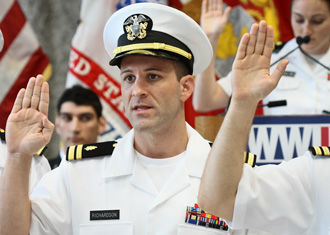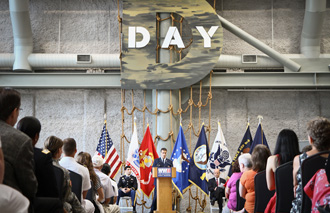Dr. G.I. Joe: from military to medicine
“I had no intention of joining the military. I finished college and had just sent out my medical school applications. But on Sept. 11, 2001, those planes crashed in New York and Washington and everything changed,” says Tulane medical grad Brad Richardson.

Tulane medical graduate Brad Richardson participates in the military commissioning ceremony promoting him to captain in the Medical Corps. (Photos by Guillermo Cabrera-Rojo)

At the National WWII Museum in New Orleans, the commissioning ceremony honors medical graduates.
Wanting to help in any way that he could, Richardson decided to put medical school on hold and enlist in the U.S. Army. Becoming a physician had always been a priority, so Richardson was surprised at how much he enjoyed his part as an elite Army Ranger.
After his first tour with the Rangers, Richardson joined the special forces of the Green Berets for a second tour in Iraq.
“I thought I would just go off to the army for a year or two, find Bin Laden, come home and go back to med school,” says Richardson. “I didn't realize I would enjoy it so much.”
But after seven years of service, he decided it was time to take off the uniform and get back into the classroom. He interviewed at several different schools throughout the country, but ultimately chose the culture of the Tulane School of Medicine and New Orleans.
This past weekend, he graduated along with 17 other military medical students at Tulane.“It was a bit of a shock to the system at first, but I've loved all four years of being at Tulane. Although I'm excited about the future, I am very sad to leave,” says Richardson.
Next for the Green Beret is a residency in neurosurgery at Walter Reed Army Medical Center in Washington, D.C.
The Tulane School of Medicine graduates more military graduates than any other nonmilitary school in the U.S., says Dr. Marc Kahn, senior associate dean at the medical school.
